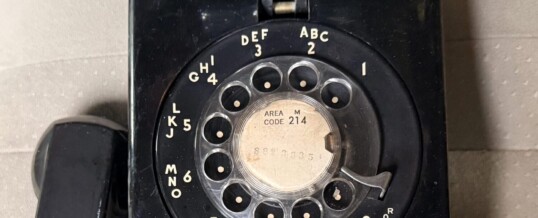
There are many once-common aspects of the telephone that are now gone.
How many phones people had, etiquette for using one, how phones worked, the existence of telephone company operators, and phone service features.
Growing up in Ashdown, Arkansas, those I knew who had a phone usually just had one. People of means had an extension. Usually in the master bedroom.
Many families didn’t have a phone at all. A telephone was relatively expensive and monopolized by Ma Bell, who charged what she wanted. So a phone was a luxury.
For those in rural areas, you were probably on a party line and had to share your phone with other people in your area, which meant if they were using the line, you couldn’t. It also meant they could listen to your phone calls and you could listen to theirs.
Today, almost everyone has their own phone. Even kids.
But on Beech Street in our small, redbrick house, we had just one. A yellow phone that hung on the kitchen wall. And we didn’t get that one until I was in third grade.
My dad felt that a phone was nothing more than a bell in your house that any idiot could ring whenever they wanted. To a degree, that was true, but my mom wanted a phone, so we got one.
Once we got one, the rules were laid down: No using the phone without permission. And permission was usually to talk to your grandparents when they called to wish you happy birthday or to answer the phone when it was ringing when your mom couldn’t answer it.
Whenever mom couldn’t answer it that almost always led to a tussle between my sister and me to see who could get to it first.
Phones today work nothing like the landlines that brought instant communication to the masses. Stationary phones, either on a flat surface or hanging on the wall, worked with a dial tone.
Cellphones work off of signals transmitted to regional towers. The phones of yesterday required wires. Millions of miles of wires.
Without a wire to your house, you didn’t have a phone connection.
The first phones required another person, an operator, to hear you connecting to them by picking up your receiver, or earpiece. The operator would then ask who you wanted on the line and they’d try to get them for you.
Operators were a one-stop-shop for a caller. If you weren’t sure of the address of a person you were trying to find again after several years, but you knew in what city they were now living, you dialed or punched zero and the operator could look them up with a phone directory, or phone book, as it was called.
Most of us only had a phone book for the town in which we lived. Later, the phone company offered directory assistance by calling 411.
Operators were also very helpful. They took the time to help small kids if they called for any reason. The operator also was famously portrayed on television and in the movies when someone would ring them up and say, “Operator, get me the police!”
All of this came at a cost.
Phone service was expensive. There was a base cost just for having the service, but calling anyone outside of your own immediate area was prohibitively expensive. Long distance calls cost several dollars a minute. For perspective, several dollars is about what most men made in a month.
By the 1930s and 40s, rotary phones came into the picture. You could call people yourself. Operators were still around if you needed help, but dialing was up to you.
Push button phones arrived in the bigger areas of the country in the 60s, but it was the 80s before they were common where I was in southwestern Arkansas and northeastern Texas.
I remember when the radio station where I was working in Texarkana got push button phones. It was as if Christmas came early. Radio control rooms are a very busy place. Pushing buttons sped things up a lot.
Everything changed in the early 1990s. Cellphones became widely available.
I remember doing live radio broadcasts virtually every weekend in the early 90s, from a cellphone, to tell the public that a new phone deal was available and to come on down.
And they did. One Christmas Eve, almost 500 people got a cellphone in four hours.
From Alexander Graham Bell to today, we are connected in a way that old Mr. Bell likely never imagined.
When it’s my time to call Heaven, my sister won’t have to tussle with me over who’s going to answer it. They’ve already taken her call.
When they take mine, I hope it’s a party line. There are lots of folks I can’t wait to talk to. And at that point, it’ll be a local call.
©2025 John Moore
John’s books, Puns for Groan People and Write of Passage: A Southerner’s View of Then and Now Vol. 1 and Vol. 2, are available on his website TheCountryWriter.com, where you can also send him a message.
JUN
2025
